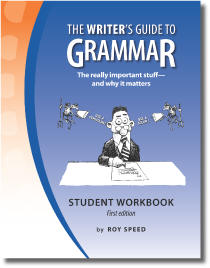|
THE BLEND: WRITING & COMMUNICATION
Foundations of Writing
The Writer's Guide to Grammar — taught by the author
 This two-semester course is taught by Roy Speed, author of The Writer's Guide to Grammar. It puts in place skills and knowledge foundational to the study of English and the mastery of clear writing: This two-semester course is taught by Roy Speed, author of The Writer's Guide to Grammar. It puts in place skills and knowledge foundational to the study of English and the mastery of clear writing:
- Mastering the language. In the on-site class each week, students master all the most important principles of the English language — including grammar, usage, punctuation, and more.
- Becoming a strong reader. In the online class, they are introduced to close reading of great literature — in this case, Shakespeare. Students learn all the skills attendant on close reading, like annotating the text. They also read relevant examples of fine literary analysis, essays that are models of the form.
1) English fundamentals
In Foundations of Writing, Roy Speed leads students through a kind of boot-camp in English grammar, usage, and punctuation — intensive training that relies on his own extraordinary material. (See the reviews on Amazon.) Most important, Roy Speed teaches grammar principles not for their own sake, but as requisites for important writing tools — as keys to perceiving both:
- how our language works;
- what makes writing effective.
The course enables students to:
- master the most important points of English grammar and usage;
- perceive with little effort both the structure of a sentence and how proper punctuation can enhance that structure;
- employ with dictionary-precision a rich arsenal of English words.
 2) Close reading of great literature 2) Close reading of great literature
Students in Foundations of Writing undergo intensive study of Shakespeare, reading three plays in their entirety:
- Romeo & Juliet — our introduction to Shakespeare, including the Elizabethan theater, blank verse, and wordplay, as well as Shakespeare's satire, humor, and remarkable imagery;
- Hamlet — an exploration of Shakespeare's longest play (and perhaps his most ambitious), in which we examine the beliefs and values of the period and reveal what's really going on with Hamlet;
- Macbeth — an astonishingly condensed play from Shakespeare's mature period, in which he examines human conscience from a remarkably modern perspective.
Texts to purchase
Grammar. For the on-site classes in grammar, usage, punctuation, and vocabulary, the instructor provides our workbook and other proprietary materials.
Shakespeare. For the online Shakespeare classes, your student will need the following texts — all links below are to the correct editions on Amazon:
- Romeo & Juliet, by William Shakespeare.
ISBN-13: 978-0198321668 | ISBN-10: 019832166X
- Hamlet, by William Shakespeare.
ISBN-13: 978-0198328704 | ISBN-10: 0198328702
- Macbeth, by William Shakespeare.
ISBN-13: 978-0198324003 | ISBN-10: 0198324006
In this intensive study of Shakespeare, students experience real insight — into the psychology of characters, into human nature, into life itself — and experience for themselves what great writing can achieve.
In the process, they learn important study skills, like close reading and annotation. Equally important, they learn to get beyond the literal meanings of words to the vast landscapes of meaning behind the words. They read essays representing the finest in literary analysis and see for themselves what it looks like to deliver great insights and support them with specific evidence.
|
|
|
Our approach to ...
Writing
Writing is one of the most difficult subjects to teach — partly because it is not a single complex skill, but rather a host of different skills, all intertwined. It is also a process — and like all complex processes, it is susceptible to ineffective and inefficient approaches.
To write effectively, students must have:
- command of language — the ability to put thoughts into clear English, with rich vocabulary, sound usage, and correct punctuation;
- knowledge, perceptions, and insights — in other words, they must have something to say;
- convincing arguments — the ability to present a sound case, with clear points supported by solid evidence;
- a sound process — an approach that not only includes all the critical steps, but presents them in the most efficient and effective sequence, e.g., getting your thoughts clear before you try to write sentences and paragraphs.
Writing at The Blend, accordingly, is predicated on the following principles:
- To produce clear writing, students must first have clear thoughts.
- To write in a particular form — like the essay — they must first understand and appreciate that form, i.e., they must explore models of that form.
- Students must learn to appreciate the craft of writing, with real insight into what gives a sentence real impact, what makes a train of thought easy to follow, what makes an argument compelling.
- They must be equipped with a rich arsenal of tools not only for writing, but for thinking, for working with thoughts and ideas.
For all these reasons, we teach writing in stages, with the first stage being Foundations of Writing in the Green Blend — a course in which our students become adept at working with language, including everything from punctuation to vocabulary and basic reasoning. In the Blue Blend they take Logical Communication, in which they explore working with ideas and logical flow.
Finally, in the Gold Blend's Essay Writing & Appreciation, our students read and come to appreciate great essays and begin to write essays themselves.
We felt relief at having found [The Blend] and had high hopes from the beginning. Everything we wished for our daughter has come true. Your insight is amazing. The respect with which you treat the students is admirable, as is your ability to challenge them and interest them in what you teach. We are also happy with the peer influences exerted. I would recommend The Blend to anyone searching for an excellent education in an excellent environment. We look forward to another year.
—Mom of 13-year-old
daughter, classical homeschooler
|
|
![]()